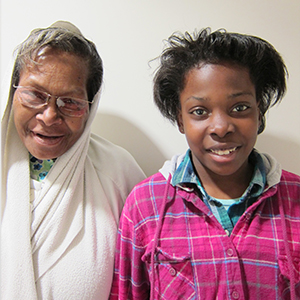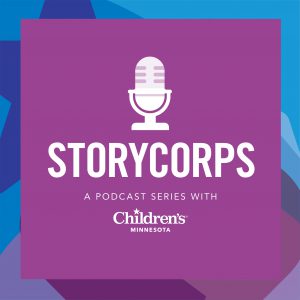Sickle Cell: Patricia and Bjork’s story


About this episode
Mother, Patricia, and daughter, Bjork, discuss the resilience rooted in sickle cell disease. Although sickle cell pain crises can be challenging, support from Children’s Minnesota has allowed for a strong bond to form between mother and daughter.
Topics:
- Advice/messages
- Resilience
- Fears and challenges: Grief/despair
Transcript
Patricia: 31 days after you were born, I got word that you had sickle cell—and I don’t know the long professional name for it—but by the time you were maybe two months old, I started seeing that you were having some issues from there. At about 18 months is when you had your first pain crisis.
Bjork: When I got older, like seven or eight, I still had those paid [sic] crises and you would get my medicine to help me stop crying. One day, I had a pain crisis and we went to the doctor. She asked, ‘How long have you been having these pain crises?’ and you said, ‘For a couple of years’. She said, ‘Oh, I’m going to get this person that I know that might be able to help you with sickle cell’. She went to go get the lady, and that lady asked, ‘Would you prefer a port-a-cath?’ She told me the port-a-cath is for a blood transfusion because every month I get a blood transfusion to get that old blood out and get new blood in. When I got my port, and the first time I went for my transfusion, I stopped having pain crises. Every month, I would slow down, but I wouldn’t have a pain crisis, and when it was time for me to go, I would feel better after I got done with my transfusion always has my back. When I get sick, she’ll say, ‘Do you need anything?’
Patricia: They all take care of you when you’re not feeling well. I’ve got to give them that. For me, I never knew what sickle cell was. I’m learning about sickle cell. I had never heard of it before, I know no one who has it—I’ve never known anybody who has it. I haven’t met anybody who has it…well, I guess I’ve found out about two or three other people since you’ve had it, but otherwise I didn’t know a thing about sickle cell. I still haven’t learned too much other than it’s a blood disorder, but again, you have that port where you get those transfusions—that’s your issue. We haven’t experienced what other people have experienced, I’m assuming. We don’t have medical issues every day. You take your medicine and go on about your business; you don’t get down. You’ll have a pain crisis every now and then when you get cold or overextended, stuff like that, but you aren’t really sick from your sickle cell, and that’s the best thing that I can say about it—and that’s all I can say about it—because I believe it’s the transfusions that hold you up so good. I don’t have to run to the hospital anymore to take you for pain crises, or any other issues. To grow up and be a successful person. I don’t know whether you’re going to be a doctor, lawyer.. That doesn’t bother me as long as you are successful and not a criminal. Every now and then, you get a little hiccup and it’ll cause you to have a little pain crisis, but given that we have pain medications and massages and hot water, you’re back to yourself the next morning. You just have to ride through that night, that’s all. I just wish you didn’t have it at all, but since you do have it, you handle it very well. Who would you say is your biggest influence?
Bjork: My mom—I mean, you. That wasn’t the saddest time, but that was [one]. My other saddest time was when I’m in the hospital and there’s nobody there besides me.
Patricia: Oh, OK. Gotcha.
Bjork: Those are my sad times.
Patricia: I have a fit when you’re going through your pain because I want it to hurry up and go away, and there’s no medicine that can make it hurry up and go away, but it will eventually. Once you take it, it’ll go away, but it just takes a few minutes, for it to go away, but it goes. Honey, thank you for this time.
Bjork: Thank you for bringing me here to spend time with you and talk.
We wish to extend our thanks to the families who have shared their story here about the impact of living with hemophilia and sickle cell disease. We would also like to thank the many who worked on this project:
The Children’s Minnesota StoryCorps Legacy Team:
Eddie Gonzalez, Jocelyn Bessette Gorlin, Susan Kearney, Stephen Nelson, Margaret Heisel-Kurth, Stephanie Davis, Angela Blue, Elizabeth McDonough, Jill Swenson and Alisa Linne.
Special thanks to:
Stephanie Moua, Hamdi Hussein, Sadia Farah, Fatima Ali, Caillyn Costello, Suzanne Lehman, Suzan Ulrich, D'Ann Urbaniak Lesch, Justin Nelson, Allison Albright, Marvin Holmes-Leopold, Jose Rodriguez and Mitch Hare.
Minneapolis Institute for Production and Recording:
Jose Rodriguez and Mitch Hare.